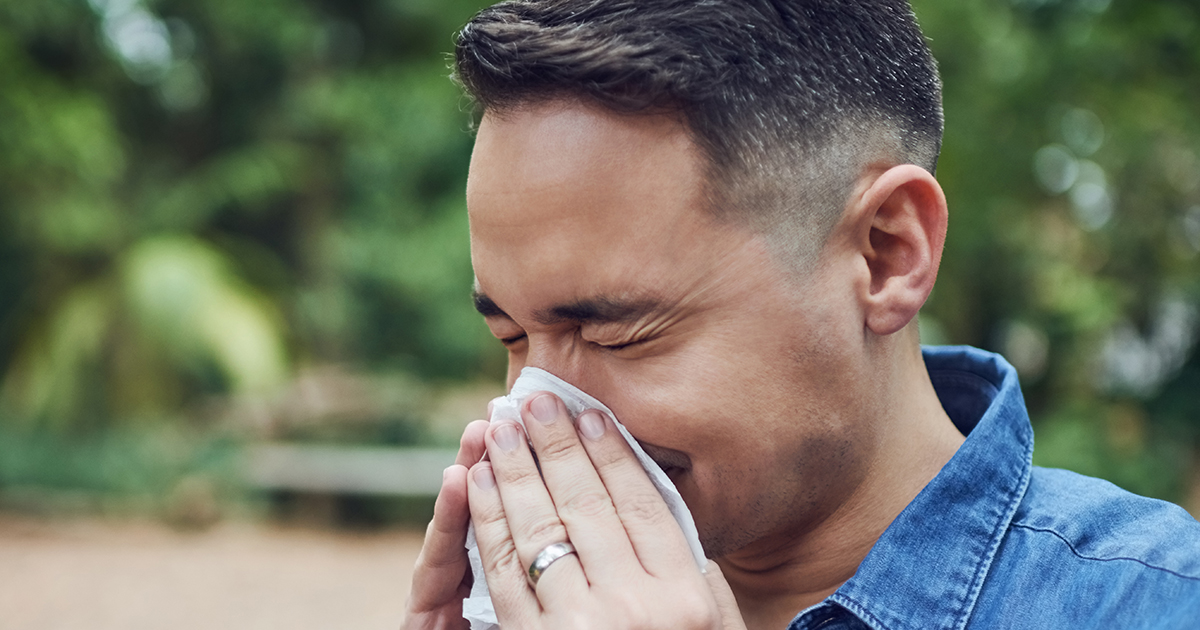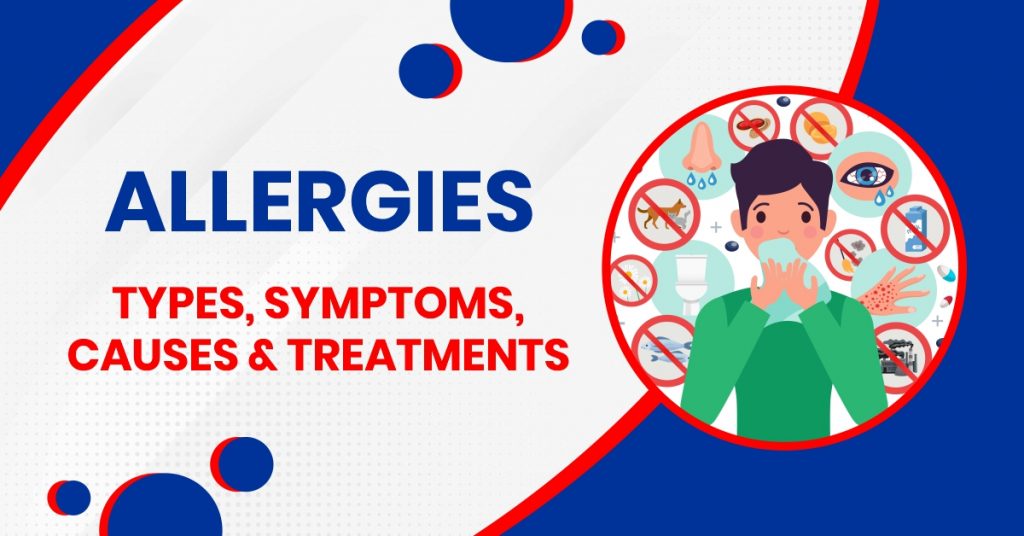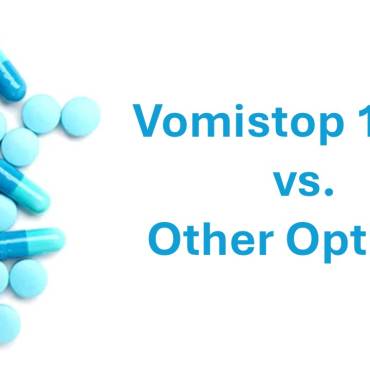Allergies are your body’s response to a foreign particle or protein, which may be pollen, bee venom, or food that doesn’t cause a reaction in most people. Usually, these particles are harmless but sometime may lead to harmful reactions. The foreign substance which causes an allergic reaction is known as an allergen. The immune system produces antibodies that fight against foreign substances inside the body; during allergies, the antibodies identify a particular allergen as harmful, even though it isn’t. When your body comes in contact with an allergen, it causes your immune system to produce antibodies leading to inflammation, sinuses, airways, or digestive system problems.
The allergic reaction severity varies from person to person. This severity ranges from minor irritation to anaphylaxis reaction (a potentially life-threatening emergency). No treatments for allergies exist, but allergy relief options are available as allergy medicines that help you eliminate the symptoms.

Symptoms
Allergic reaction symptoms depend on the allergen involved, ranging from mild to severe. Some of the allergy symptoms which may appear are as follows:
-
Hay, allergic rhinitis that leads to
- itching of the nose, eyes, or roof of the mouth
- sneezing
- runny, stuffy nose
- watery, red, or swollen eyes (conjunctivitis)
-
A food allergy can cause reactions as follows:
- swollen lips/tongue/throat/mouth
- Tingling in the mouth
- Hives
- Anaphylaxis
-
Allergic reaction to an insect sting
- Swelling at the sting site
- itching or hives all over the body
- wheezing, cough, chest heaviness or shortness of breath
-
Allergic reaction to drugs
Causes
An allergic reaction is a response by your immune system against a harmless substance. The immune system mistakes that substance or allergen as harmful and produces antibodies that cause allergy symptoms.
Common allergens or triggers include:
- Airborne allergens such as pollens, animal dander, dust mites, moulds
- Foods such as peanuts, tree nuts, wheat, soy, shellfish, eggs, and milk
- medications, penicillin, or penicillin-based antibiotics
- latex or substances you touch which cause allergic skin reactions.
Diagnosis
To diagnose whether you have an allergy, your physicians will likely:
- Ask detailed questions about signs and symptoms.
- Perform a physical exam.
- Note down your possible symptoms and possible triggers.
There are some tests also:
- Skin test – the skin is pricked with small amounts of proteins found in common allergens. If there is any reaction at the location of the test, then you are allergic to that substance.
- Blood test – Specific antibody tests are performed, known as the Radioallergosorbent test or ImmunoCAP testing; this test brings the exact numbers of allergy-causing antibodies into your bloodstream. This provides evidence of sensitivity to possible allergens.
Treatment
The allergy treatment methods are as follows:
Allergen avoidance
After identifying your allergens or triggers, it’s best to avoid them to prevent allergic reactions and reduce symptoms.
Medications
There are no allergy reaction treatment methods, but there are medicines that can reduce your immune system reaction and ease the symptoms. There are various non-prescription and prescription anti-allergy medicine for treating the symptoms of allergens. There are various drugs in the form of pills, liquids, nasal sprays, or eye drops.
- Antihistamines are the best allergy medicine that reduces the antibodies in the body against allergens.
- Decongestants are also allergy relief medicine used cautiously when treating an allergic reaction due to higher side effects and concerns related to long-term use. Oxymetazoline, phenylephrine, and pseudoephedrine are used in serious conditions.
- Immunotherapy – This treatment involves purified allergen extracts, usually given over a few years, and this leads to the treatment of severe allergic reactions.
- Epinephrine – This is required only for serious allergic reactions. The patients require to carry an emergency epinephrine shot at all times. An epinephrine shot can reduce symptoms during severe reactions until the required treatments appear.
Home Remedies
Most of the allergic reactions are not severe and can be treated with basic home remedies:
1. Sinus congestion and hay fever symptoms
Saline nasal irrigation is the best way to reduce these symptoms. Patients can use a neti pot or buy a specially designed squeeze bottle to flush out thickened mucus and irritants from the nose. But using neti pots or other devices requires proper guidance and knowledge.
2. Household airborne allergy symptoms
These symptoms appear due to dust mites or pet dander; avoiding allergens is the best way to soothe these symptoms. Wash your bedding and stuffed toys in hot water frequently, maintain low humidity, regularly use a vacuum with a fine filter such as a high-efficiency particulate air filter and replace carpeting with hard flooring can prevent allergic reactions most of the time.
3. Mold allergy symptoms
Reducing moisture in damp areas, such as baths and kitchens, and using ventilation fans and dehumidifiers help prevent mould allergy symptoms. Fix leaks inside and outside your home.
There is alternative allergy treatment for various allergens, such as allergic rhinitis, which can be treated with acupuncture.
Prevention
There are some general measures to prevent allergic reactions:
- Avoid known triggers; the best way to avoid allergic reactions is to avoid allergens.
- Keep a diary- Track your activities and eating habits to identify your allergens, avoid allergic reactions, and consult your doctor with descriptions of your symptoms and allergens.
- If you are dealing with animal allergies, avoid petting, hugging, or kissing animals, and don’t allow them in your bedroom or on your furniture.
- Seek medical help in the case of an emergency.
Allergies can be frustrating if you know what’s triggering your immune system. However, a healthcare specialist can help you achieve allergy relief. They can prescribe the best allergy medicine after screening your condition.
Also Read: What are the Top Allergens During Summer?
admin
Latest posts by admin (see all)
- What is Triluma Cream? Uses, Benefits, and How It Works for Skin - December 26, 2024
- What Causes Dark Spots? Understanding the Science of Hyperpigmentation and How Skin Lightening Products Help - December 26, 2024
- Tretinoin Gel vs. Cream: Which Formulation is Right for Your Skin? - December 20, 2024



